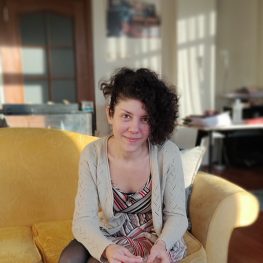Start
19 November 2024 - 12 h 45 min
End
19 November 2024 - 2 h 00 min
Address
View mapCategories
Departement SeminarUnderstanding power, resistance and oppression in Kurdish diaspora
Dr. Canan Coskan (CeSCuP; independent)
What are the social and political psychological factors that contribute to the steadfastness of marginalized communities resisting against oppression, dispossession, and criminalization at the intersections of the matrix of domination such as racism, colonialism, capitalism, sexism, cisheteropatriarchy, and ableism? How we can contribute to such resistances? In my research line, to find answers in a situated and contextualized way, I center around the experiences of my ethnoracialized and colonized community (i.e., Kurds) and I examine the understandings of power from below in relation to an anticolonial stance for supporting the collective resistances of my community (i.e., Kurds) and for proposing a tentative ground of (re)imagining power among all resisting peoples.
A special focus on the capacity/ability of fighting against racialized colonialism requires us to consider a different (from “power over”) and contextualized (in sociogeopolitical spaces) form of power organized from below and mobilized for resistance. Migration and diasporization constitutes a part of the sociogeopolitical reality in which we, as the members of ethnoracially marginalized groups, make sense of our social power and (re)actualize this power from below in our resistance. Kurds have gone through waves of (internal and international) forced migration because of racialized colonial violence but this did not stopped us from existing by resisting. After 5-years of examining Kurdish power in Western Turkey and North Kurdistan, I turned my research lens toward Kurdish migrants and their descendants in Belgium. In this talk, I will present freshly cooking findings from the recent interview study and the participatory action research about the understandings of power among diaspora Kurds in Belgium. Preliminary findings suggest that Kurdish power in diaspora is understood through contexts and sources. Participants made sense of Kurdish power by a deliberate mental shuffling across relevant contexts in which they consider intergroup relations, ingroup dynamics, and larger oppressive systems. They further explained Kurdish power in terms of its various sources, which included social organization, material resources, collective emotions, epistemic existence and resistance, and cultural factors. I hope to discuss what these findings mean for resisting communities in diaspora and how these preliminary findings converge with / diverge from the existing social psychological concepts and theorizing.
Le séminaire aura lieu dans la salle de réunion du CeSCuP ainsi qu’en ligne, via ce lien : https://teams.microsoft.com/l/meetup-join/19%3a34a093c9eea043c0a6dd9b5cd4cdd2a8%40thread.tacv2/1731415227049?context=%7b%22Tid%22%3a%2230a5145e-75bd-4212-bb02-8ff9c0ea4ae9%22%2c%22Oid%22%3a%22e5543702-1628-4726-b5c4-a1eac25bde08%22%7d


